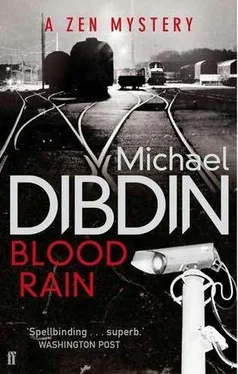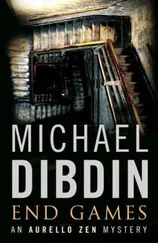Michael Dibdin - Blood rain
Здесь есть возможность читать онлайн «Michael Dibdin - Blood rain» весь текст электронной книги совершенно бесплатно (целиком полную версию без сокращений). В некоторых случаях можно слушать аудио, скачать через торрент в формате fb2 и присутствует краткое содержание. Жанр: Полицейский детектив, на английском языке. Описание произведения, (предисловие) а так же отзывы посетителей доступны на портале библиотеки ЛибКат.
- Название:Blood rain
- Автор:
- Жанр:
- Год:неизвестен
- ISBN:нет данных
- Рейтинг книги:3 / 5. Голосов: 1
-
Избранное:Добавить в избранное
- Отзывы:
-
Ваша оценка:
- 60
- 1
- 2
- 3
- 4
- 5
Blood rain: краткое содержание, описание и аннотация
Предлагаем к чтению аннотацию, описание, краткое содержание или предисловие (зависит от того, что написал сам автор книги «Blood rain»). Если вы не нашли необходимую информацию о книге — напишите в комментариях, мы постараемся отыскать её.
Blood rain — читать онлайн бесплатно полную книгу (весь текст) целиком
Ниже представлен текст книги, разбитый по страницам. Система сохранения места последней прочитанной страницы, позволяет с удобством читать онлайн бесплатно книгу «Blood rain», без необходимости каждый раз заново искать на чём Вы остановились. Поставьте закладку, и сможете в любой момент перейти на страницу, на которой закончили чтение.
Интервал:
Закладка:
Although the body had been discovered in the province of Catania, the ensuing investigation was technically speaking the responsibility of the police force having jurisdiction in the province where death had taken place. In the present case, this was an extremely moot point. In its peregrinations across Sicily, the train had passed through the provinces of Palermo, Caltanissetta, Palermo once again, Agrigento, Caltanissetta bis, Ragusa, Siracusa, and finally Catania. Six jurisdictions could thus assert a claim to investigate ‘the Limina atrocity’, to use another journalistic label soon attached to the affair. The wagon in which the corpse was found could not be traced with certainty to any of the many and only partially documented stops which the train had made, and even if it had, its original provenance as a ‘death chamber’ remained unknown.
None of this would have much mattered, of course, if it hadn’t been for the provisional identification of the victim. On the contrary, everyone would have been only too happy to hand such a messy, unpromising case to their provincial neighbours on either side. Some vagrant had jumped a freight train somewhere down the line. He may have had a specific goal in mind, or just wanted to move on. Yet a further possibility was that he was on the run from someone or something, and needed to resort to clandestine forms of transport.
Unfortunately for him, the loading door on the wagon he selected had closed at some point after his entry. Perhaps he had even shut it himself, for greater security, not realizing that it could not be opened from the inside. Or maybe some jolting application of the brakes had done it, or simply the force of gravity acting on one of the gradients the train had climbed during its journey through the mountains.
At all events, the door had closed, locking the intruder inside. At that time of year, daytime temperatures reached well over one hundred degrees, even on the coast. Inside the sealed metal freight wagon, standing for days at a time on isolated sidings in the full glare of the sun, a hypothetical thermometer might well have recorded temperatures as high as one hundred and thirty.
Trapped inside that slow oven, the victim had recourse to nothing but his bare hands. His feet were also bare, and both were even barer by the time the body was discovered — stripped to the bone, in fact. The flesh had been abraded and pulped and the nails ripped off in the man’s attempts to attract attention by hammering on the walls of the wagon and, when that failed, to pry open the door. No fingerprints, obviously. There wasn’t much left of the face, either, which he had smashed repeatedly against a metal reinforcing beam, a frenzied effort at self-destruction indicating the intensity of the ordeal which he had sought to bring to a swift end.
The victim’s pockets were completely empty, his clothing unmarked. In the absence of any other information it would have been almost impossible to identify him, except for that mysterious scribble in the Contents box on the wagon’s waybill, which was eventually deciphered as being not ‘limoni’- ‘lemons’ — but ‘Limina’. It was this which ultimately led to the authorities in Catania being allotted jurisdiction in the case, for the Limina family ran one of the principal Mafia clans in that city, and Tonino, the eldest son and presumptive heir, had been rumoured to be missing for over a week.
The woman was standing at the comer of the bar, below a cabinet displaying various gilt and silver-plate soccer cups, photographs of the shrine of Saint Agatha, and a mirror reading, in English: ‘Delicious Coca-Cola in the World the Most Refreshing Drink’. She was drinking a cappuccino and taking small, precise bites out of a pastry stuffed with sweetened ricotta cheese. In her early twenties, she was wearing a pale green linen dress and expensive sandals with heels. Her brown hair, streaked with blonde highlights, ran smoothly across her skull, secured by a white ribbon, then poured forth in a luxurious mane falling to her shoulders.
Nowhere else in Italy would this scene have rated a second of anyone’s attention, but here it was seemingly a matter of some general concern, if not indeed scandal. For although the bar was crowded with traders and customers from the market taking place in the piazza outside, this woman was the sole representative of her sex present.
Not that anyone drew attention to her anomalous presence by any pointed comments, hard looks or tardy service. On the contrary, she was treated to an almost suffocating degree of respect and courtesy, in stark contrast to the rough-and-ready treatment handed out to the regulars. While they jammed as equals in the jazzy rhythms of male talk, fighting for the opportunity to take a solo, she was deferred to in an outwardly respectful but in practice exclusionary way. A request that her tepid coffee be reheated was met with a cry of ‘Subito, signorina!’ When she produced a cigarette, an outstretched lighter materialized before she had a chance to find her own, like a parody of a seduction scene in some old film.
But although the atmosphere was almost oppressively deferential, it could not have been said to be cordial. The other customers all clustered at the opposite end of the bar, or backed away towards the window and the door, creating a virtual exclusion zone around this lone female. Their voices were uncharacteristically low, too, and their mouths often casually covered by a hand holding a cigarette or obsessively brushing a moustache. For some reason, this unexceptionable woman appeared to be regarded as the social equivalent of an unexploded bomb.
When the man arrived, the palpable but undefined tension relaxed somewhat. It was as if one of the problems which the woman’s presence represented had now been neutralized, although others perhaps remained. The newcomer was clearly not a local, even though his prominent, prow-like nose might have suggested some atavistic input from the Greek gene pool which still surfaced here from time to time, like the lava flows from the snow-covered volcano which dominated the city. But his accent, the pallor of his complexion, his stiff bearing and above all his height — a good head above everyone else in the room — clearly ruled him out as a Sicilian.
To look at, he and the woman might have been professional acquaintances or rivals meeting by chance over their morning coffee, but that hypothesis was abruptly dispelled by a gesture so quick and casual it could easily have passed unnoticed: the man reached over and turned down the label of the woman’s dress, which was sticking up at the nape of her neck.
‘A lei, Dottor Zen!’ the barman announced at a volume which might or might not have been intended to undercut the politeness of the phrase. With a triumphant yet nonchalant gesture, he set down a double espresso and a pastry stuffed with sultanas, pine nuts and almond paste. Zen took a sip of the scalding coffee, which jolted his head back briefly, then pulled over the copy of the newspaper which the woman had been reading, DEATH CHAMBER WAGON TRACED TO PALERMO, read the headline. Aurelio Zen tapped the paper three times with the index finger of his left hand.
‘So?’ he asked, catching his companion’s eyes.
The woman made a gesture with both hands, as though weighing a sack of some loose but heavy substance such as flour or salt.
‘Not here,’ she said.
And in fact the bar had suddenly become amazingly quiet, as though every single one of the adversarial conversations previously competing for territorial advantage had just happened to end at the same moment. Aurelio Zen turned to face the assembled customers, eyeing them in turn with an air which seemed to remind each of the company that he had urgent and pressing matters to discuss with his neighbours. Once the former hubbub was re-established, Zen turned back to start his breakfast.
Читать дальшеИнтервал:
Закладка:
Похожие книги на «Blood rain»
Представляем Вашему вниманию похожие книги на «Blood rain» списком для выбора. Мы отобрали схожую по названию и смыслу литературу в надежде предоставить читателям больше вариантов отыскать новые, интересные, ещё непрочитанные произведения.
Обсуждение, отзывы о книге «Blood rain» и просто собственные мнения читателей. Оставьте ваши комментарии, напишите, что Вы думаете о произведении, его смысле или главных героях. Укажите что конкретно понравилось, а что нет, и почему Вы так считаете.











